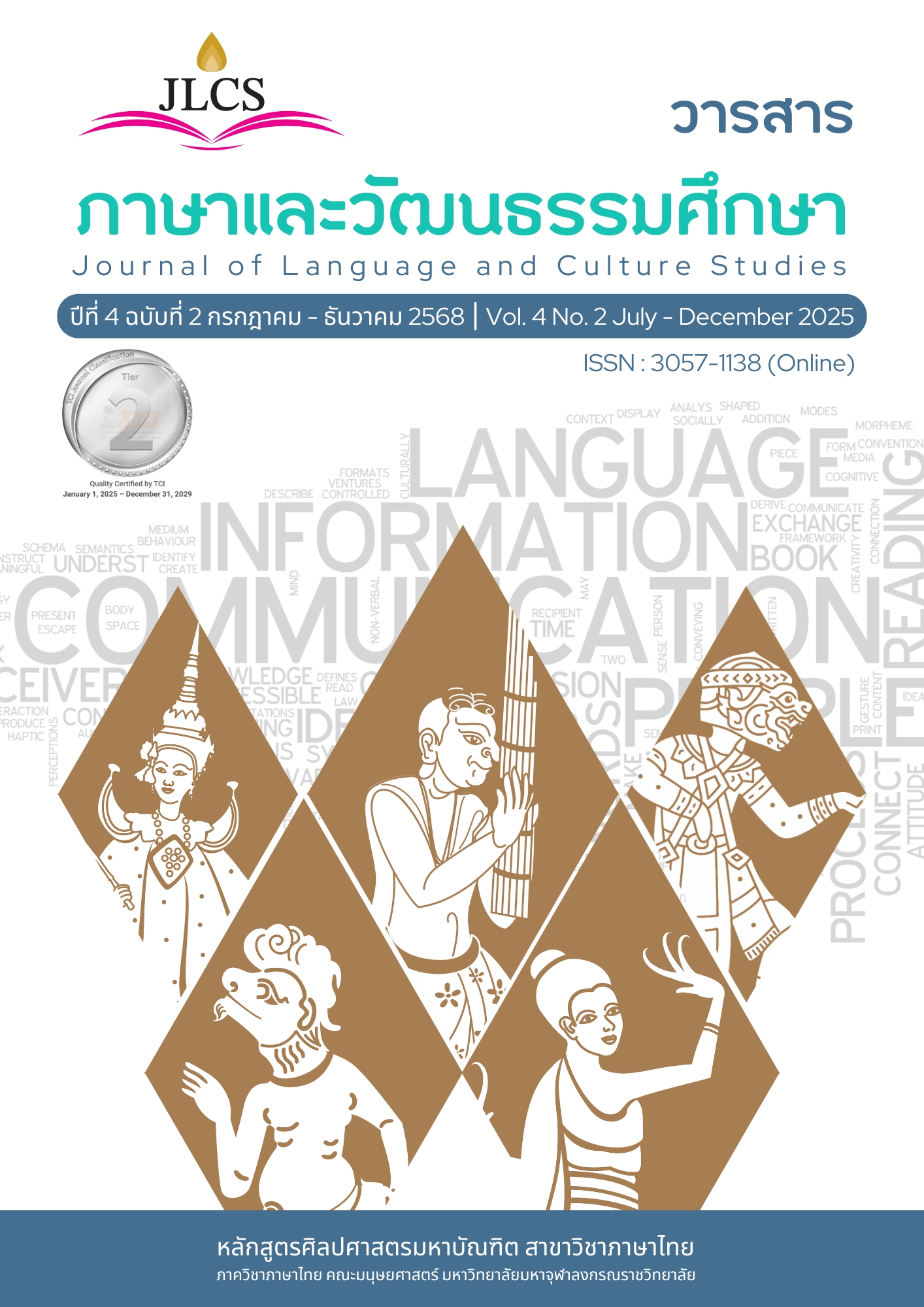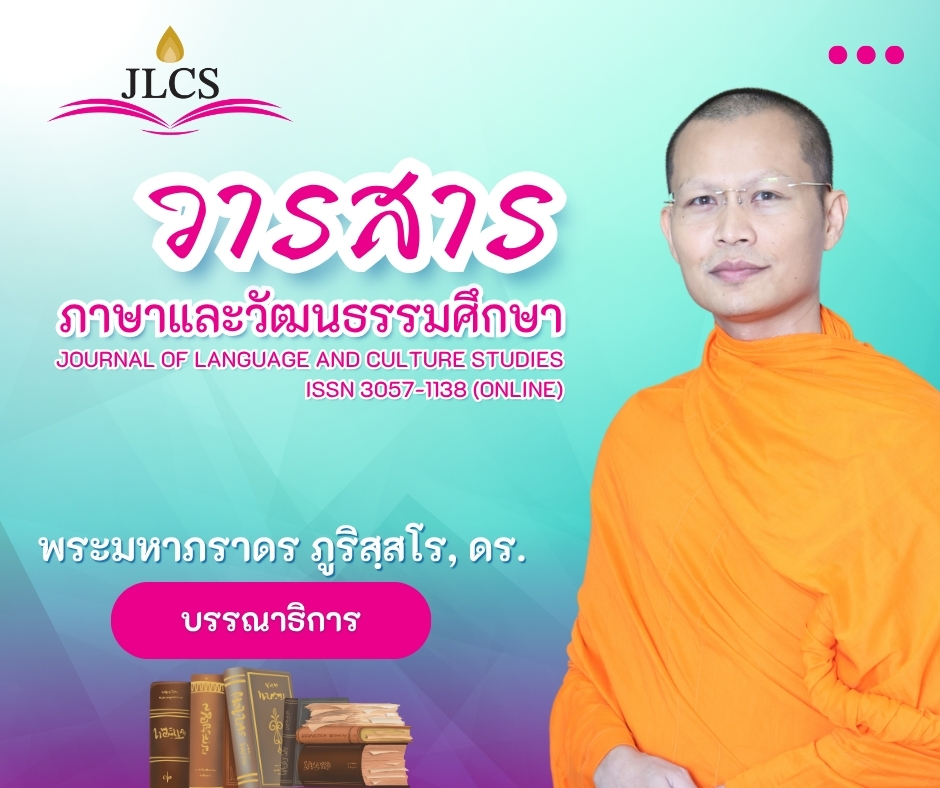Enhancing Four English Skills for Pre-Intermediate Students in the Mon Buddhist Society at Mahachulalongkornrajavidyalaya University (Main Campus), Thailand
คำสำคัญ:
English Proficiency, Four English Skills, Task-Based Learning, Engagement, Quasi-Experimentalบทคัดย่อ
This research aims to: (1) compare pre- and post-learning test results to evaluate the effectiveness of English Language skills enhancement program, (2) analyze student feedback and behaviors during the learning period to define the factors that influence the development of the language skills and, (3) advance the four English Language skills such as listening, speaking, reading and writing of pre intermediate students in Mon Buddhist Students Society (MBSS) at Mahachulalongkornrajavidyalaya University (Main Campus). A quasi-experimental one-group pretest-posttest design utilized in this study and a sample of eighteen students designated through the purposive sampling. The data collection instruments included a four-skills proficiency test (pre-test and post-test) and a feedback survey, as well as behavioral observation during the 10-week program. Descriptive statistics were used to analyze the quantitative data from the pre- and post-tests, while qualitative data from feedback and observations underwent a thematic analysis to identify emerging factors and trends.
The research findings showed that listening skills improved significantly by 30%, while speaking and reading skills improved slightly by 2% and 1% respectively. Writing skills, however, saw a slight decline by 6%. The students' feedback and behavioral observations reflected increased engagement, practical application of knowledge, and development in group collaboration. The findings highlight that the practical, task-based activities are significantly effective for improving language proficiency particularly listening and speaking skills. On the other hand, there is an urgent need to develop more effective teaching strategies and practices to boost the writing skills in the near future.
เอกสารอ้างอิง
Anderson, R. C. (2005). Role of the reader's schema in comprehension, learning, and memory. In R. B. Ruddell & N. J. Unrau (Eds.), Theoretical models and processes of reading (5th Ed.). (pp. 594–606). International Reading Association.
Braun, V. & Clarke, V. (2006). Using thematic analysis in psychology. Qualitative Research in Psychology, 3(2), 77–101.
Ching, H. S. (2014). Enhancing speaking skills through role-play activities. International Journal of Language Education, 6(3), 210–219.
Creswell, J. W. (2014). Research design: Qualitative, quantitative, and mixed methods approach (4th ed.). California: SAGE Publications.
Day, R. & Bamford, J. (2002). Top ten principles for teaching extensive reading. Reading in a Foreign Language, 14(2), 136–141.
Ellis, R. (2003). Task-based language learning and teaching. Oxford: Oxford University Press.
Ferris, D. R. (2011). Treatment of Error in Second Language Student Writing (2nd ed.). Ann Arbor: University of Michigan Press.
Gibbons, P. (2015). Scaffolding language, scaffolding learning: Teaching English language learners in the mainstream classroom (2nd ed.). Portsmouth, NH: Heinemann.
Godwin-Jones, R. (2018). Using mobile devices in the language classroom. Language Learning & Technology, 22(3), 3–17.
Grabe, W. (2009). Reading in a second language: Moving from theory to practice. Cambridge: Cambridge University Press.
Hadjer, M. (2024). Digital storytelling and podcasting in language acquisition: A systematic review. Journal of Educational Technology, 39(1), 67–83.
Harmer, J. (2007). The practice of English language teaching (4th ed.). China: Pearson Longman.
Hyland, K. (2003). Second language writing. Cambridge: Cambridge University Press.
Hymes, D. (1972). On communicative competence. In J. B. Pride & J. Holmes (Eds.), Sociolinguistics: Selected readings (1st Ed.). (pp. 269–293). Penguin.
Johnson, D. W., & Johnson, R. T. (1999). Learning together and alone: Cooperative, competitive, and individualistic learning (5th ed.). Boston, MA: Allyn & Bacon.
Khamkhien, A. (2010). Teaching English speaking and English-speaking tests in the Thai context: A reflection from Thai perspective. English Language Teaching, 3(1), 184–190.
Kolb, D. A. (2015). Experiential learning: Experience as the source of learning and development (2nd ed.). Upper Saddle River, NJ: Pearson Education.
Kongsom, T. (2016). Investigating the effect of peer feedback on EFL students' writing. PASAA: Journal of Language Teaching and Learning in Thailand, 51, 73–102.
Mahachulalongkornrajavidyalaya University. (2023). MCU annual report in 2023. Phranakorn Sri Ayutthaya: Mahachulalongkornrajavidyalaya University.
Ministry of Education Thailand. (2023). English language education policy framework 2023–2027. Bangkok, Thailand: Office of the Basic Education Commission.
Mon Buddhist Students Society. (2023). Decadal review of language programs. Phranakorn Sri Ayutthaya: Mon Buddhist Students Society Publications.
Nation, I. S. P. (2009). Teaching ESL/EFL reading and writing. New York, NY: Routledge.
. (2013). Learning vocabulary in another language (2nd ed.). Cambridge: Cambridge University Press.
Nunan, D. (2004). Task-based language teaching. Cambridge: Cambridge University Press.
. (2015). Teaching English to speakers of other languages: An introduction. New York, NY: Routledge.
Raimes, A. (1983). Techniques in teaching writing. Oxford : Oxford University Press.
Pregoner, J. D. (2024). Research approaches in education. New York, NY: Academic Insight Press.
Richards, J. C. (2008). Teaching listening and speaking: From theory to practice. Cambridge: Cambridge University Press.
Richards, J. C., & Rodgers, T. S. (2001). Approaches and methods in language teaching (2nd ed.). Cambridge: Cambridge University Press.
. (2014). The changing face of language learning: Learning beyond the classroom. Cambridge: Cambridge University Press.
Schmitt, N. (2008). Vocabulary in language teaching. Cambridge: Cambridge University Press.
Thornbury, S. (2005). How to teach speaking. Harlow, England: Pearson Education.
Vandergrift, L., & Goh, C. C. M. (2012). Teaching and learning second language listening: Metacognition in action. New York: Routledge.
Vygotsky, L. S. (1978). Mind in society: The development of higher psychological processes. Cambridge, MA: Harvard University Press.
Zhang, J., & Suwanarak, K. (2021). Understanding the role of meaningful input in second language acquisition. Journal of Asia TEFL, 18(2), 493–512.









